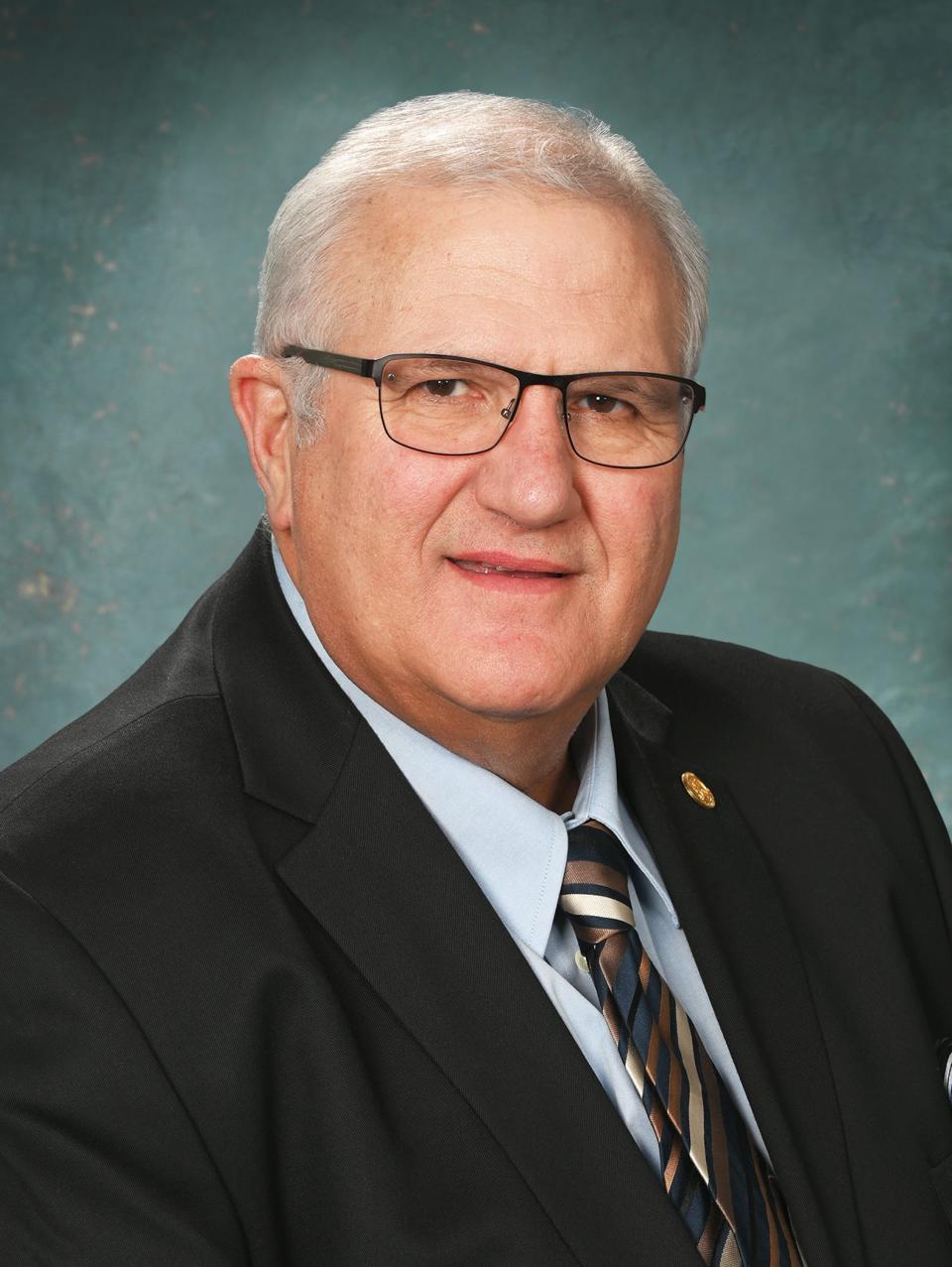Lenawee County's state lawmakers help advance 2022-23 budget plans
- Oops!Something went wrong.Please try again later.
ADRIAN — Lenawee County’s state legislators last week supported spending bills that advanced in the House and Senate as the two chambers develop their budget plans for the fiscal year that starts Oct. 1.
The Republican-led Michigan Senate on Wednesday approved a 5% increase in base funding for K-12 schools but pared back Gov. Gretchen Whitmer's proposals to recruit and retain teachers and did not include her proposed $1 billion fund for school infrastructure projects.
The $17.8 billion school aid bill, which was advanced 20-15 along mostly party lines, sets the stage for broader budget talks with the Democratic governor and the House.
The base per-student grant would rise by $450, to $9,150, under the Senate's 2022-23 proposal — slightly more than Whitmer's suggested $435. A $500 million grant program would be created to help combining districts retire some of their debt to avoid raising property taxes. Schools could get $50 more per pupil to address pandemic-related learning loss.
Sen. Wayne Schmidt, a Traverse City Republican who oversees the school budget, called it a “very good first start.”
While the next fiscal year begins in October, legislators at a minimum target completing the K-12 budget before July — the start of school districts' budget year. The Senate passed most of its overall $74.2 billion spending plan on Tuesday.
“The Senate budget plan prioritizes building a brighter future in Michigan while also providing much-needed tax relief for families struggling to make ends meet in the face of the highest inflation in 40 years,” state Sen. Dale Zorn, R-Onsted, said in a news release. “In addition to directing funds to fix local roads and support Michigan workers, we are building on our historic commitment to K-12 education. Helping our students get a great education is critical to the future of our state, and this budget increases our record level of school funding by over $860 million — including $70 million to help address learning loss due to COVID-19 shutdowns.

Zorn said to help students beyond high school, part of the Senate’s plan would provide $361 million for a new Michigan Achievement Scholarship, which would cover up to $3,000 annually at a community college or $6,000 annually at a university.
The budget plan increases support to $55 million for the Going Pro program to provide grants to support employee training, provides $40 million for the Michigan Reconnect program to assist people seeking an associate degree or a trade certificate, invests $41.7 million to improve access to dentists for low-income families, and invests nearly $2 billion in local government transportation funding to help fix local roads, according to Zorn’s news release.
The plan also prioritizes more revenue sharing for local governments, a $1 million increase for Secondary Road Patrol grants to help support emergency response and traffic enforcement on local county roads, and more resources to train and hire 170 new state troopers.
Democrats unsuccessfully tried amending the bill so it would more closely align with what the governor outlined in February.
Whitmer has called for $1 billion to be spent upgrading school buildings over six years, which is not in the Senate plan.
She wants $2.3 billion over this fiscal year and the next to recruit and retain educators. That would include awarding annual bonuses to teachers and other staff, competitive college scholarships to would-be educators, stipends to student teachers and “grow-your-own” grants to help districts support staff who want to become certified as teachers. The Senate bill has about $30 million, mostly for student teachers.
Additional retention and recruitment funding would ensure that educators “have the support and recognition they deserve for the challenging and essential work that they do,” said Sen. Winnie Brinks, a Grand Rapids Democrat who voted against the legislation. The bill also would allocate less than what the governor requested for student mental health and school safety.
Schmidt said nothing is finalized and funding could be added during negotiations. He noted that the legislation would expand the number of school-based health clinics and boost aid to train and retail mental health staff.
In the House, lawmakers finished voting on a series of spending bills Thursday, approving a $76.3 billion budget proposal.
State Rep. Bronna Kahle, R-Adrian, said the House’s plan works to provide people with tax relief while investing in public services.

“Lenawee County families have been burdened by the impacts of inflation at the gas pump, grocery and pharmacy,” Kahle said in a news release. “This plan takes important steps to offer significant tax relief to help offset increased costs of living while continuing to fund critical public services and dedicate federal dollars to projects that will have long-lasting benefits for years to come.”
Kahle said the House’s plan includes a $1 billion tax cut, nearly $214 million in local water infrastructure projects, and $6.8 billion for the Michigan Department of Transportation, including an additional one-time investment of $750 million specifically for local roads.
The House’s K-12 budget sets the per-pupil funding amount at $9,000, which is less than the Senate’s $9,150 and Whitmer’s proposed $9,135.
The House’s education budget includes more than $500 million for teacher recruitment and retention; $300 million in school safety initiatives, including student mental health; an additional $210 million for special education cost reimbursements; and more resources for rural transportation, Kahle’s news release said.
“This is a plan that reflects the priorities of the people of Lenawee County,” Kahle said. “Hard working taxpayers expect and deserve quality roads, safe neighborhoods, top-notch educational opportunities for their kids, and a healthy economy where businesses and workers thrive. I have great confidence in this balanced budget that helps Michigan today and for years to come.”
Leaders from both chambers are expected to hammer out differences between the proposals before landing on final legislation to send to Whitmer for her signature.
Rep. Thomas Albert, R-Lowell, who chairs the Appropriations Committee, touted the budget blueprint as an investment in Michigan's future, highlighting one-time funding to offset debt in public employees' pension systems and bolstering state savings in case of an economic downturn.
Democratic House lawmakers, however, took issue with "boilerplate" language — which puts parameters on how money is spent — in the school aid bill barring school districts from allowing transgender athletes to play on girls' sports teams. In order to receive state aid, a district must prohibit "boys from competing for a position on or competing on a girls', women's, or female team," the bill states.
Democrats blasted the budget as "radical" and "extreme" in a news release.
"These budgets reek of political posturing and point-scoring from top to bottom," House Democratic Leader Donna Lasinski of Scio Township said in a statement Thursday. She said that "the Republican majority is more interested in cramming these bills with divisive, incendiary language intended to drum up the extremists in their base and those hellbent on stoking a culture war in this country than they are in working to support Michigan’s communities."
Abortion access also emerged as a flashpoint in budget deliberations in both the state House and Senate last week. In the Senate, Republican lawmakers rejected a Democratic amendment to strike language from the budget proposal restricting funding to health care providers who provide abortion services. The Republican-sponsored health and human services appropriations bill passed by the state House includes a similar restriction.
Celebrating the budget proposal during floor remarks Thursday, Albert said he was "most proud" of parts of the budget that include spending for prenatal and postnatal care.
"We are offering a pro-life plan that supports pregnant mothers, including those with crisis pregnancies, and provides them with all their choices — not just the one 'choice' promoted by abortion advocates," he said in a statement Wednesday.
The Detroit Free Press and Associated Press contributed to this report.
This article originally appeared on The Daily Telegram: Reps. Kahle and Lightner, Sen. Zorn help advance 2022-23 budget plans

